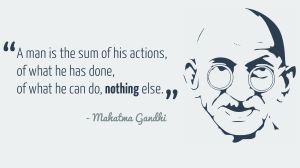 A few years ago I was asked to produce a high impact presentation on the strengths and opportunities for improvement of the organisation’s leadership capability. The presentation would be used to introduce a facilitated discussion on leadership at their annual global leadership conference.
A few years ago I was asked to produce a high impact presentation on the strengths and opportunities for improvement of the organisation’s leadership capability. The presentation would be used to introduce a facilitated discussion on leadership at their annual global leadership conference.
My solution was to use the global IC network to identify credible, astute, representative spokespersons at all levels below MD who would be prepared to give honest (anonymous) responses on tape to the following three questions:
- What characteristics do you look for in a good leader?
- How do you think our leadership capability compares with other places you have worked?
- What one change would significantly improve leadership in our organisation?
The responses to the first question were illuminating more for what was left out than for the suggested characteristics. A torrent of descriptions covering the spectrum of personal values – honourable, genuine, role model – and the ability to make things happen – inspirational, decisive, effective, but not a single allusion to personal responsibility.
In today’s litigious and over-exposed society, the temptation to avoid commitment and deny responsibility is pervasive, from the top of government and the heads of corporations down. Consequently, when you do encounter an example of personal responsibility, it is so unexpected and remarkable that the amount of goodwill it generates is disproportionate.
I know this from personal experience.
Flying to the UK from Jersey recently I, unusually, booked a case into the hold. At check-in, the clerk offered to check my carry-on into the hold FOC. I accepted the offer as I would already be waiting for one case at the other end. I have no idea what happened to the case but it must have been an extraordinary incident as one corner was completely destroyed and my laptop was damaged beyond repair.
At no time was I told that any valuable items in my hand luggage would not be insured if I checked in the bag. As I had my laptop and my new £400 camera in the case, had I been informed of this condition, I would never have checked it.
EasyJet baggage insurance immediately accepted liability for the case. However, it was only when I made a claim for the contents of the case – an entirely separate claims process – that I found out about the insurance caveat for baggage contents placed in the hold. I was advised to try either
I was incensed and in no mood to follow their advice to pass on what was clearly EasyJet’s liability onto either my travel insurance company or my home and contents insurance company.
Internet searches on customer complaints suggested that it might be productive to write to EasyJet CEO Carolyn McCall. An article in The Guardian cited her as one of the CEOs who responded quickly and personally to a test email sent by The Observer.
My own email to Carolyn McCall sent on Monday morning resulted in an email from their Baggage Claims Manager early Tuesday morning with an apology for their previous handling of the issue and an invitation to get in touch for resolution. Having submitted copies of paperwork and evidence I received a phone call the following day with an offer of a very generous cash settlement. It was more than I had expected and has transformed me into a staunch advocate of the airline.
Even though I didn’t receive a personal response from Ms McCall, the speed and quality of the response I did receive supported the point made by Marcus Williamson, founder of ceoemail.com, at the end of The Guardian article:
“I find the responsiveness of the chief executive tends to reflect the responsiveness of the company overall. It’s like a barometer – the less responsive the chief exec, the lower the overall customer satisfaction in a company.”
Carolyn McCall gets it. It’s just a shame that more CEOs don’t appear to see this as part of their job description.
